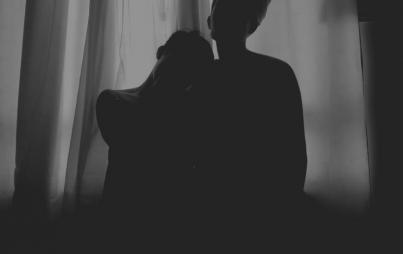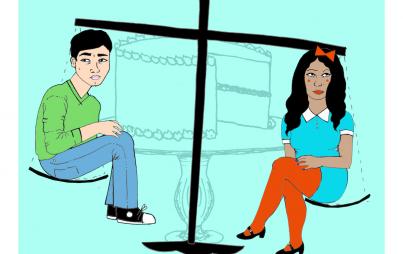
Here’s what I know right now: my story will have many more ups and downs.
Being a human is hard. Being a human with an eating disorder is inexplicably hard. Every time I think I have control over the situation, my eating disorder pulls a fast one on me and reminds me what is really in charge — food and exercise.
Here’s my story.
A little over a year ago, I read Melissa A. Fabello’s piece Inside my Eating Disorder. A few days later I emailed her this:
I've been reading your work and your most recent article really resonated with me... I'm a graduate student, and for a while, I justified missing meals and explained it away as being "busy." What I'm realizing is, when you have OCD it's incredibly easy to perpetuate and rationalize these behaviors. In my mind, it sounds something like this, “well, I didn’t eat that much yesterday, and I was fine, so I’ll be okay today.” If you add in running rituals (weekly minimum mile counts, time trials), you can see where this is going. I can relate to the feeling that your body/mind is playing tricks on you. In fact, when I was running this morning, I thought a person was waiting at the bus stop only to recognize as I got closer nobody was there.
That was the first time I wrote about or acknowledged my eating disorder to myself (or anyone else). However, a year later, I’m still wavering between owning where I’m at and dealing with it, and aggressively denying my reality during weekly therapy sessions, bi-weekly doctor’s appointments, and amidst my co-workers’ remarks about my weight and food habits.
My eating disorder didn’t start from me wanting to be skinnier.
It evolved because I was attempting to ascertain control wherever I could, in an environment that was damaging and unsupportive. I was so unhappy.
And my current predicament is reason enough for me to be more conscious of the choices I’m making surrounding my body. I don’t love (anymore) people telling me that now I look good or asking “how I did it.” I don’t want to be stuck anymore. I’m sad that I’m destroying my body; there are so many things I want my body to be able to do.
It’s important to acknowledge everyone’s story is different, and in a lot of ways, mine doesn’t feel like the “typical” eating disorder narrative. My BMI is technically categorized as overweight (that doesn’t matter). I eat something three times a day. I don’t work out for more than an hour a day. These facts make it hard for me to believe I have an eating disorder. But, I have an eating disorder.
Here are four examples that make that statement irrefutable:
1. I cried when I had to take antibiotics for an injury I got at the gym.
I was dizzy because I didn’t eat enough before going to the gym. I recognized that I felt dizzy, but I had a plan and was committed to finishing my workout. Consequently, I slammed a weight on my finger because I was dizzy and couldn’t see the rack when I was putting it back. My injury required stitches, and I also had to take antibiotics. When I got home from the doctor, I cried, and I started Googling, “do antibiotics make you gain weight?” I went down this rabbit hole for nearly an hour reading fitness blogs, WebMD, and “health” magazine articles; I was still crying. I was afraid that the antibiotics would make me hungry and bloated.
My fear of gaining weight and the awareness that this situation was both entirely my fault and now out of my control was debilitating. I restricted even more for those ten days, and I did it deliberately. This was so problematic and twisted. The truth is, if I died from an infection from my stitches it wouldn’t matter how much I weighed or what I did or didn’t eat.
2. Every time I eat something out of my comfort zone all I can do is ruminate.
I know there’s no such thing as good or bad food. I believe there are foods that make my body feel good and others that make my body feel bad. I also believe there are few foods that make my body feel good, and that’s how I justify eating the same thing every day. When I stray from my “usual” I get anxious. I attempt to rationalize my choices by talking about it relentlessly. I exhaust everyone around me with commentary about “real ingredients” and “clean eating.” I talk about intuitive eating (which is a good thing!), how it’s okay because I don’t eat like this all the time, or how it’s fine (psst it was anyway) because I’m going to work out later. Often, I find myself compensating by restricting the next day, or if I can prepare for these “indulgences," then I fixate on it all day until I can allow myself to engage in the socially acceptable behavior of eating — which ultimately leads to bingeing. I do all the mental math, so I know how to undo or prepare for my mistakes. Inevitably, regardless, I feel guilty and upset.
When I realized that I talk about food and spend more mental energy thinking about food than practically anything else I do during a typical day, I could not deny the existence of my eating disorder.
3. If I can't get to the gym I panic.
I’m obsessed with exercise. To normalize this, I’m always training for something — which means I have a strict workout schedule and training plan. When I miss a workout, everything feels out of whack, and even before I realize it, I'm compensating with food or getting off the bus a few stops early to walk farther home. I start Googling things like, “Are bananas bad for you?," “Does shoveling snow count as cross-training?," or “How many calories do you burn walking up a flight of stairs?”
I mean it; I know how many calories I can burn going up or down a single stair, a flight of stairs, or climbing at a moderate pace for ten minutes. I know which loop around my office building is exactly one mile, and get antsy if I know I’m not going to get to the gym and I am too busy at work to squeeze in a walk. I’m not bragging about the useless knowledge I’ve acquired related to calories and exercise; they’re just the facts right now. These facts help me to understand how messed up my relationship with food and my body is right now. If I miss my workout, I compulsively seek out the next quick fix. I’m obsessed with exercise both because of the adrenaline and the curative element I think it has.
I realized it was a problem when my best friend told me that when I come to visit him — for vacation — I can't work out. He thought this quip was funny; I heard it as a threat. His statement almost made me cancel my trip. When I reflected on that notion, the fact that not being able to work out might keep me from seeing my best friend and a new city, my eating disorder was in my face both praising me for how disciplined I am and shouting at me about how problematic my thinking is.
4. I tried to swap calories from food with calories from alcohol.
This is a big “no-no”! We all need food especially if we’re going to drink alcohol.
One time, I got nervous about an impending night out because I thought I was going to do a lot of “damage.” I woke up early to run before breakfast, and I didn’t taste a single dessert I made for the party all day. In fact, I didn’t eat all day after breakfast. I purposely walked to the farthest grocery store to get one item (I had to get some extra steps in). By the time our night out commenced, I convinced myself I deserved the excess calories from alcohol, and proceed to drink multiple shots of tequila on an empty stomach (p.s. that’s called binge drinking, and I don’t recommend it).
Not surprisingly, the evening didn’t go well for me. I ended up sick and hysterically crying while my friends (bless them) took care of me. My world came crashing down for a few hours (many of which I don’t remember). This should have been the lesson I needed to learn to understand the necessity of food. Yet, the next morning, I still felt like I needed to restrict and “get back on track” from the weekend.
I know there is no healthy approach to food that includes swapping or allocating calories, and if you’re going to drink alcohol, you need to eat. That’s not even a debate. This was a reality check for me.
I have an eating disorder.
Phew. Okay! This was the scariest thing I’ve ever put into words, and coming to terms with my eating disorder makes me feel incredibly fragile.
Here’s what I know right now: my story will have many more ups and downs.
There will be days of denial, avoidance, and anxiety. I will probably exhaust myself with many perpetual, problematic Google searches before I am satisfied. However, there will also be days of triumph and gains. I’m excited to feel liberated from the shackles to my 0% fat Greek yogurt and half marathon training plans.
To conclude, I wrote this story for me, but I can only hope that my story will have some profound impact on or resonate with someone else. Maybe it will inspire another person to tackle their fears, speak up about their experiences, and strive for recovery instead of reduction and restriction.








